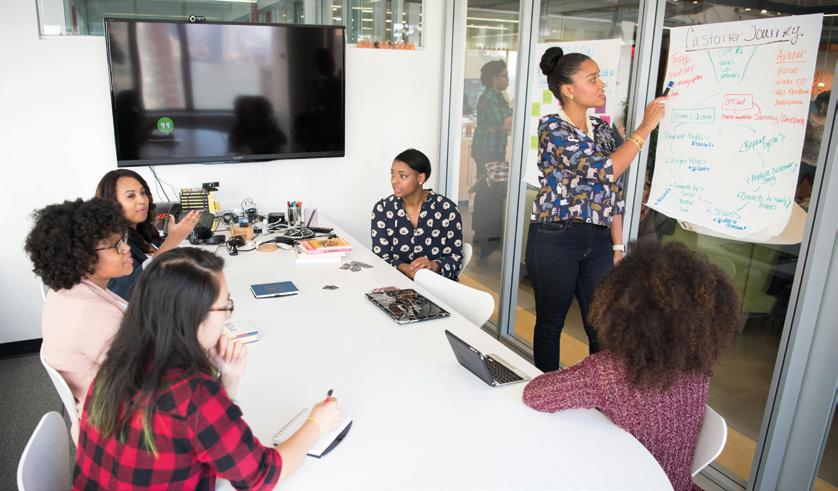
4 minute read
Unlocking productivity: How businesses can work smarter, not harder
In today’s fast-paced business landscape, productivity isn’t just a buzzword, it’s a competitive advantage. Whether you're a start-up founder, a team leader or a CEO steering a large organisation, the ability to get more done without burning out your team is key to long-term success.
But productivity isn’t about squeezing more hours out of the day; it’s about working smarter, creating the right environment and empowering people to do their best work. So, what does that look like in practice?
The shift from busy to productive For years, productivity was measured by output – how many tasks were completed, how many hours were logged. But modern businesses are shifting away from the “always-on” culture and embracing a more strategic approach.

When employees feel valued and supported, they are more likely to take initiative, solve problems creatively and stay motivated.
Flexible working, clear communication and a shared sense of purpose all contribute to a culture where productivity can thrive. It’s not just about tools and tactics; it’s about people.
The role of technology
Technology can be a powerful productivity booster, but only when used intentionally. From project management platforms like Asana and Trello to communication tools like Slack and Microsoft Teams, digital solutions help streamline workflows and keep teams aligned.
However, tech overload can have the opposite effect. Constant notifications, app-switching and digital distractions can fragment attention. The key is to choose tools that simplify, not complicate, and to set boundaries around their use.
Focus and flow
One of the most underrated aspects of productivity is focus. Research shows that deep work i.e. uninterrupted, concentrated effort, leads to higherquality output. Yet in many workplaces, distractions are the norm.
Encouraging time-blocking, reducing unnecessary meetings and creating quiet zones or “focus hours” can help employees get into a state of flow. It’s not about working longer –it’s about working with intention.
Leadership matters
Leaders play a crucial role in shaping productivity. By setting clear goals, removing roadblocks and modelling healthy work habits, managers can create an environment where teams thrive.
Micromanagement, unclear expectations and reactive leadership can stifle productivity. Instead, empowering teams to make decisions, take ownership and learn from mistakes fosters resilience and results.
Being busy doesn’t always mean being productive. In fact, constant multitasking, endless meetings and reactive workflows can drain energy and reduce focus. The most productive teams are those that prioritise, plan and protect their time.
Culture is key
At the heart of productivity is culture. Businesses that foster trust, autonomy and psychological safety tend to see higher engagement and better results.


Measuring what matters
To improve productivity, businesses need to measure it but do so wisely. Metrics should reflect meaningful progress, not just activity. For example, tracking project milestones, client satisfaction or revenue growth offers more insight than counting emails sent or hours worked.
Regular check-ins, feedback loops and performance reviews can help teams stay aligned and adjust course when needed. Productivity isn’t static – it evolves with the business.
Wellbeing and sustainability
Perhaps the most important shift in the productivity conversation is the recognition that wellbeing matters. Burnout, stress and overwork are productivity killers. Sustainable success comes from balancing ambition with care.
Offering mental health support, encouraging breaks and promoting work-life balance aren’t just nice-to-have, they’re essential. A healthy team is a productive team.
How do we stay productive in Wandsworth?
Wandsworth is a productive London borough, as illustrated by its thriving business services sector, robust infrastructure and growing tech ecosystem. The borough’s strategic development – including the transformation of Battersea into a global creative and tech hub and the emergence of St George’s Hospital as a life sciences cluster – further reinforce its productivity credentials.
In addition, Wandsworth Council’s 2024/25 Productivity Plan outlines a commitment to efficient service delivery and sustainable growth. The plan integrates key performance indicators across sectors such as education, housing and climate initiatives, aligning with the borough’s Corporate Plan and MediumTerm Financial Strategy.
Property developer Tariq Usmani, CEO of Lock Terrace, based in Wandsworth, says ensuring his time and that of his business partner and brother, Kashif, and their team is “spent efficiently” is key to boosting productivity.
“I’m a big believer in laziness drives efficiency,” he says.
“I want to ensure my time is spent efficiently on what I need to do. My brother and I work extremely well together; you can’t slide a piece of paper between us. He is a brilliant problem solver, and we are both people who have a meeting and are already working on actions from that meeting within it. We don’t sit back; we get on with it.”
Focus on output
Productivity in business isn’t about doing more, it’s about doing what matters, better. It’s about creating a culture where people feel empowered, supported and focused. It’s about using technology wisely, leading
We boost productivity by embedding employer feedback into course design, streamlining partnership processes, and investing in staff development. Our approach is collaborative and data-informed, allowing us to deliver targeted learning that meets both learner and employer needs while contributing to Wandsworth’s economic resilience and the goals of the London Growth Plan.
It is also about our attitudes and culture. You have got to with clarity and measuring progress meaningfully.

Perhaps the most important shift in the productivity conversation is the recognition that wellbeing matters. Burnout, stress and overwork are productivity killers. Sustainable success comes from balancing ambition with care.
And as Wandsworth’s examples show, productivity isn’t just about a business issue. It’s a regional and national opportunity. When businesses invest in people, infrastructure and innovation, the ripple effects are felt far beyond the office walls.
In a world that moves fast, the most successful businesses are those that know when to slow down, reflect and refine. Because real productivity isn’t just about speed – it’s about impact.




£30 ENTRYFEE or £5 ENTRY FEE iffundraising over £150

